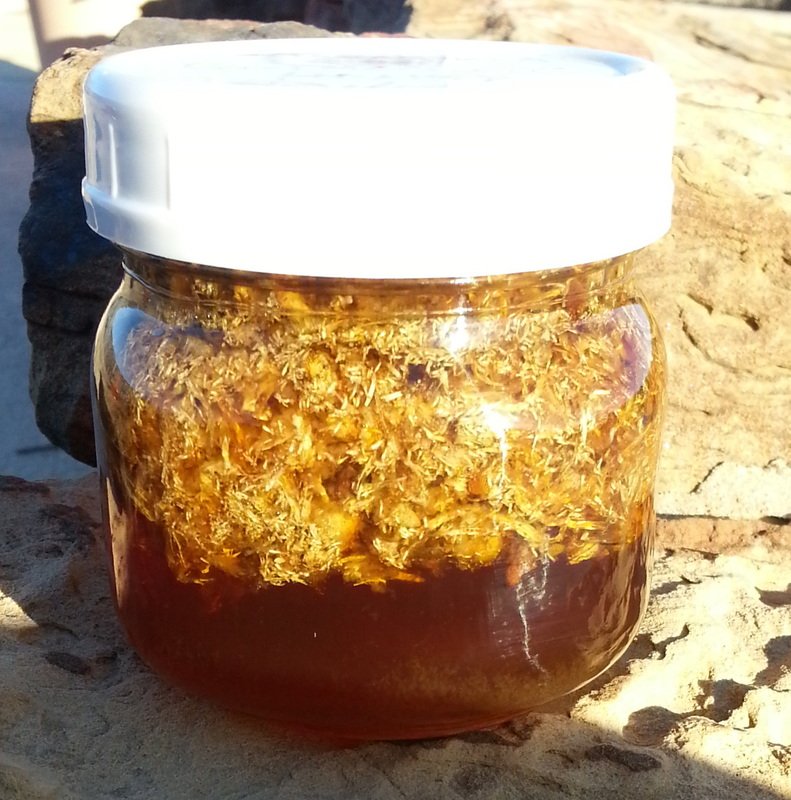
Image courtesy of comzeal at FreeDigitalPhotos.net
Sweet, rich, healing honey. It’s delicious medicine all by itself, known for being:
- antibacterial
- moisturizing
- humectant
- healing
Add in a few herbs, and you’ve got a magical combination.
Herbal honey is so easy to make that this how-to is going to be very short. You’re basically going to combine fresh or dried herbs in honey for an arbitrary amount of time. The result is an herbal honey that can be used in a variety of ways.
Herbal Honey: Easy to Make
As promised, here is how to make your own infused, herbal honey.
What you’ll need:
- raw honey
- glass jar with lid
- dried or fresh herbs of choice
- chopstick or some kind of stirring implement
Don’t get fussy about measurements. For fresh herbs, just fill the jar all the way up with chopped herb. This can be a blend or a single herb. If using dried herb, then you don’t need as much. Fill the jar only about a quarter to half of the way up. Pour honey over the herbs up as far as you can go. Use a chopstick to mix everything together thoroughly and release any bubbles that may have formed at the bottom. Cap tightly and let sit for two weeks. Keep it on the kitchen counter, or somewhere you can keep an eye on it. You’ll need to ensure that the herb doesn’t float to the top and lose contact with the honey. I do this by turning the jar upside down every other day. You can also just uncover it, stir, and recover. After two weeks, strain off the herbs, and you’re done. I use cheesecloth inside of a sieve to accomplish this. I won’t lie. It’s a sticky pain, but worth it!

I used dried herb for this chamomile honey, so the herb didn't fill the jar. That's okay. Image by Jennifer Capestany
What can you do with your homemade herbal honey? You have unlimited possibilities. Herbal honeys can be designed for taste, as a syrup or dessert topping. They can be used to make bitter tasting herbs more palatable. They make an excellent skincare product. Here are some more ideas:
- Combine ginger root with a few cloves and cinnamon chips for a soothing cough remedy.
- Lavender and vanilla make an unbelievably good honey that you can drizzle over pancakes or ice cream.
- Astragalus root, codonopsis root, and stinging nettle leaf would make a gentle, adaptogenic and immune boosting honey.
- Cold or flu? Dose yourself with cayenne and garlic honey. That tastes how it sounds by the way.
- Calendula infused honey is excellent for skincare.
- Sick tummy? Pull out the chamomile honey!
Sage honey is a favorite of mine for coughs, colds and flu. Renowned herbalist Susun Weed shows us how to do this. Super easy.

Regarding Susun's comments on using regular honey instead of raw honey for this blend, I agree. If you add raw honey into boiling water, it certainly won't be raw anymore. No need to go to the expense of raw honey if you know that your herbal honey will be used expressly in or as a tea. You may wish to purchase organic or verified local though.
Editor's Note: The information in this article is not intended to diagnose or treat illness. Always do your research before using an herbal remedy to ensure that there are no allergy risks or cross indications with any prescription medications that you are taking. See your doctor before starting any new treatments or programs. Anything that you learn from Prairie Hawk Botanica, its blog, or Jennifer Capestany must be considered informational only. You own yourself. Article originally published on Prairie Hawk Botanica's Blog. Shared by me, the original author and owner, so I give myself permission.

Author: Jennifer Capestany
Jennifer is a clinical herbalist and health coach, specializing in autoimmune diseases like rheumatoid arthritis. Her interest in plant medicine led Jennifer to spend years studying herbology, physiology, and nutrition. She works one-on-one with her clients via her herbalist and health coaching business, Prairie Hawk Botanica. Jennifer lives on a homestead in rural Texas with her husband, 2 children, and various animals. In her spare time she loves to be in her large herb and vegetable garden. Sharing herb knowledge and her love of natural healing with others is her calling. You can also connect with Jenn on Facebook and Twitter.
